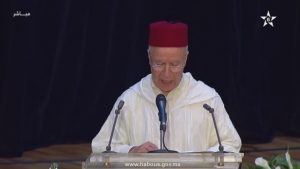Speech of M. Ahmed Toufiq Minister of Religious Endowments and Islamic Affairs in the Visit of Pope Francis to Morocco

In the name of Allah, the Compassionate, the Merciful
Majesty, Commander of the Faithful,
Your Holiness, Pope Francis 1st
In the 13th century, Pope Gregory IX ordered Thomas de Celano to write the first biography of Saint Francis of Assisi. This story has it that Saint Francis wished, before his famous trip to Egypt, to visit Morocco to meet Amir al-muminin, the Commander of the Faithful.
That is to say that the Holy See knew, since more than eight centuries, the Moroccan regime in its status of Commandery of the believers.
Indeed, Morocco has upheld this regime of early Islam; this institution based on a written socio-political contract by virtue of which the holder of the legitimacy protects, for the nation, its religion, its security, its intelligent public order, its justice and its dignity.
The training of imams and female clergy, a mission for which the Commander of the Faithful, His Majesty the King, has created this Institute, is part of this commitment to protect religion.
In line with this logic, the Commander of the Faithful has, since his accession to the throne, put in place reforms and introduced a dynamic of concordance between the modern institutional frameworks and the purposes of religion in different aspects.
This distinction means that the major issues affecting the management of Islam elsewhere are resolved in the context of the Commandery of the Faithful. These issues concernthe presence of religion in the state, its protection, its relationship to politics in general and Islamism in particular, its position vis-à-vis the implementation of Sharia, its attitude towards rigorous tendencies, its relation to freedoms and universal values, its religious education and the place of religious leadership in this system.
- The presence of religion in people’s lives and then in the Constitution is a philosophical necessity,a response to the quest for meaning, an ethical need and a moral sourcefor the nation;
- The protection of religion, in its strict sense, is ensured by human supervision, made up of Ulama (religious scholars) and imams, and facilitated by the provision of an adequate ritual and educational service;
- Religion is at the level of the nation, while partisan politics is at the level of society, a space of negotiation and dialogue;
- The rigorous currents that deny religion its spiritual dimension are foreign to Morocco; the Commandery of the Faithful protects the Sufi currents especially their social values of charity and compassion towards the needy, values like those preached by a famous Marrakesh saint, contemporary of Saint Francis of Assisi, Sidi Belaabbas who preached giving as a remedy for all evils, and who said that generosity influences the laws of the world;
- Publically, freedoms are exercised within the framework of the law. At the level of the individual, only a self-accounting consciousness imbued with spiritual ethic can regulate behavior and protect against loss;
- Through its wisdom, spirituality and achievements, Morocco has contributed to humanism; It can make its reservations known on only certain details which fall within its specific tradition;
- The traditional Quranic school, being the choice of part of the population, is incorporated in the 2001 law which organizes it, enriches it and creates bridges between its programs and those of public education;
- The Oulema, theologians, observe neutrality vis-a-vis the political currents. They issue legal opinions on matters of public interest. In 2007, they published a text, first of its kind, on the legal refutation of terrorism allegations.
The founding of this Institute by His Majesty the King is one of the strong symbols of this ingenious tradition which is inspired by religious fundamentals rooted in history and which has the strength and intelligence to adapt to the aspirations of people and to the goals of the divine message.
The components of this tradition thus offer the possibilities of building a model of integral and conscious development, where man takes care of himself while feeling, in his states of strength and weakness, bolstered by the permanent Presence of God, the Almighty, Most Gracious.
